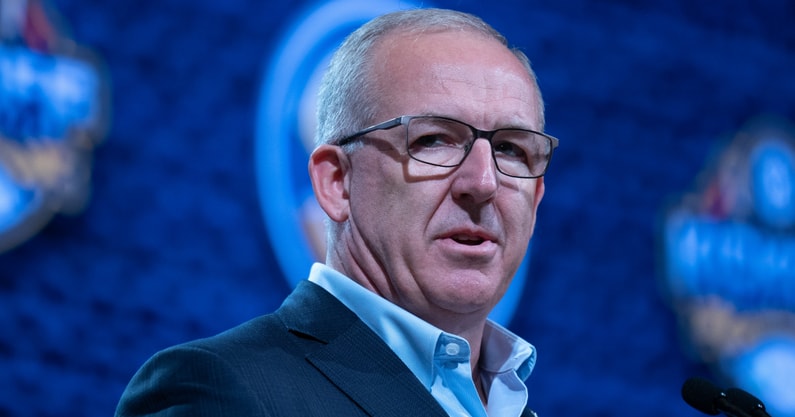Greg Sankey reveals NCAA Tournament expansion lasted 'maybe lasted five minutes' at SEC meetings

Last week, NCAA president Charlie Baker told reporters that the NCAA Tournament could expand to 72 or 76 teams by 2026. During an appearance on the “Dan Patrick Show,” SEC commissioner Greg Sankey revealed how his conference coaches reacted when he brought up tournament expansion.
“I introduced the issue to our men’s basketball coaches, which I think we’ve talked about with that group before. I would guess then, given the other issues we had on our plate, that conversation maybe lasted five minutes,” Sankey said. “My points to them were, this is still a work in progress.
“I didn’t know that there was going to be kind of a press gathering. This is not a criticism. Charlie Baker spoke about tournament expansion, I think, the day after our basketball coaches gathered. I mentioned it to our women’s basketball coaches as well briefly. It didn’t really go anywhere.”
The announcement from Baker has divided the college basketball landscape. Some fans are excited to see more teams have the chance to participate in March Madness. Meanwhile, others claim that adding teams to the historic tournament, dilutes the importance of the event.
Of course, from the NCAA’s perspective, tournament expansion is mostly about finances. More games equals more money. The NCAA Tournament last expanded in 2011 when it changed from including 64 teams to 68, with the addition of the First Four round of games.
Top 10
- 1New
2025-26 CFP, Bowls
Full schedule, times, TV released
- 2Trending
Super Regionals Odds
Betting lines for each Super
- 3
CFP Title Favorites
Ranking Top 20 to win it all
- 4Hot
Chipper Jones
Calls out Kevin O'Sullivan, Georgia baseball
- 5
Ryan Day
Calls for 4 Big Ten CFP bids
Get the On3 Top 10 to your inbox every morning
By clicking "Subscribe to Newsletter", I agree to On3's Privacy Notice, Terms, and use of my personal information described therein.
Prior to that, the format of March Madness had remained unchanged since the 64-team field was first adopted in 1985. Greg Sankey still doesn’t know if expanding the tournament is the best move.
“We should be exploring tournament expansion. Whether or not it happens, is actually another point of evaluation,” Sankey said. “So have the conversation, deep dive, figure out if it works, practically, competitively, economically.
“I think the one issue for us is, if it is expanded, let’s pick the number of 76 and I’ll do quick math for you. So 52 of the 76 teams would be like in that traditional first round. The other 24 would play in 12 games. The 12 winners meet up with the 52. There’s your 64-team bracket, right? That’s like from my intramural director days at Utica. So I know how brackets work. What I’m really interested in, we’re interested in, is who fills those 12 games, those other 24 teams?”
Only time will tell. However, judging from Baker’s latest statements, college basketball fans might be learning more about an expanded NCAA Tournament sooner than they’d previously expected.